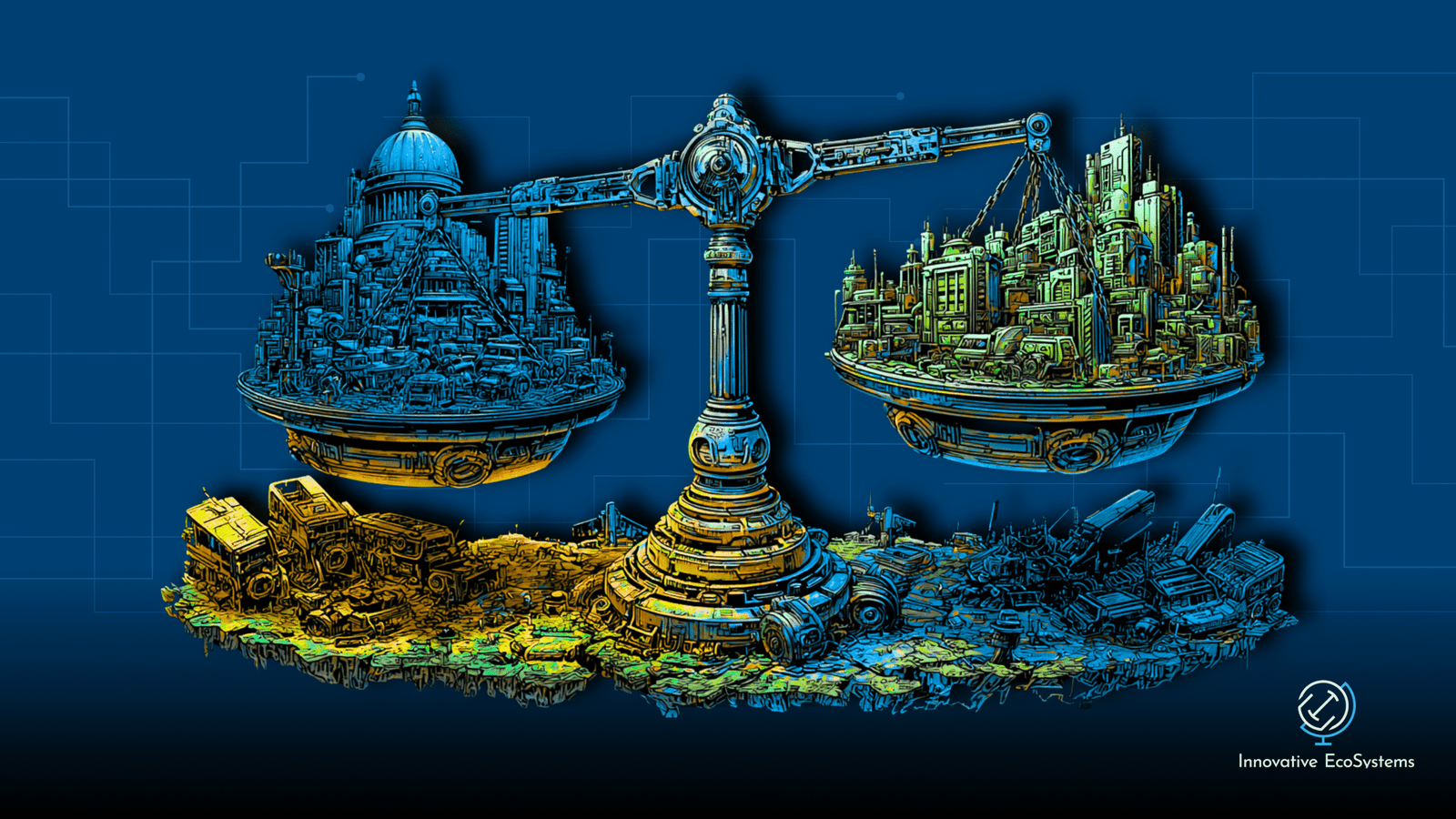Executive Summary
The World Economic Forum’s 2025 report, “Innovation Ecosystems: A Toolkit of Principles and Best Practice,” is the most comprehensive global synthesis to date of how cities, nations, and organizations can build inclusive, sustainable, and high-performing innovation districts. Developed in collaboration with Jacobs, the report offers a framework that integrates governance, placemaking, and digital infrastructure as the three essential pillars of next-generation ecosystems.
The report responds to a paradox at the heart of innovation policy: while investment in innovation districts and science hubs is accelerating worldwide, driven by a $369 billion global VC market and trillion-dollar public programs like the U.S. CHIPS and Science Act, many such projects fail to generate lasting socioeconomic returns. As WEF notes, up to 50% of innovation districts fail to achieve sustainable impact due to governance breakdowns, weak community integration, or insufficient digital and environmental foresight.
Its central contribution is a principle-based framework for responsible innovation, eight guiding principles designed to ensure that innovation ecosystems generate inclusive prosperity and sustainable impact.
Key Findings and Insights
1. A Global Inflection Point for Innovation Ecosystems
Innovation districts have become the new geography of growth. From Singapore’s Punggol Digital District to Michigan Central in Detroit and Diriyah in Saudi Arabia, cities are repositioning innovation as the foundation for urban regeneration, decarbonization, and human capital development.
However, the report cautions that the momentum has outpaced reflection, many ecosystems remain “islands of prosperity surrounded by unchanged neighborhoods.” Closing this innovation-impact gap requires inclusive design and governance.
2. The Eight Guiding Principles of Responsible Innovation
The report identifies eight universal design and governance principles, Scalable, Collaborative, Sustainable, Accessible, Efficient, Human-centric, Resilient, and Transparent, as the DNA of future-ready ecosystems.
These principles move beyond technology or real estate projects; they define a value system for innovation that is socially accountable, economically viable, and ecologically sustainable.
3. Three Interconnected Foundations
- Governance & Collaboration: Innovation districts require multi-actor governance models that bridge government, academia, and industry, the “triple helix” model exemplified by India’s T-Hub. Effective districts publish KPI sets, negotiate stakeholder priorities, and use composite impact metrics to ensure accountability.
- Human-Centric Placemaking: Successful ecosystems are designed, not just zoned. WEF highlights the critical role of architecture and spatial design in fostering collaboration, citing Manchester’s Graphene Engineering Innovation Centre as a physical “mecca” for global innovators.
- Digital Infrastructure: With 19 billion IoT devices and 94% of firms now cloud-enabled, WEF stresses that digital infrastructure is no longer a technical consideration but a core enabler of ecosystem performance and trust.
4. Lifecycle-Based Development
The report outlines best practices for each lifecycle stage of an innovation district, set-up, scaling, and maturity, and emphasizes future-oriented governance to sustain adaptability. Mature districts should evolve their governance and business models to align with technological shifts, integrating continuous ecosystem engagement mechanisms for startups, corporates, investors, and academia.
Policy and Strategic Implications
For Governments and Economic Development Leaders
- Institutionalize the Eight Principles within regional and national innovation policy frameworks.
- Adopt multi-metric accountability models that evaluate districts not only by GDP or patents but also by job quality, sustainability outcomes, and community benefit.
- Shift from speculative real estate development to mission-driven innovation districts aligned with national priorities like digital inclusion, green transition, or health resilience.
For Investors and Corporate Stakeholders
- Align corporate R&D, venture, and CSR strategies with ecosystem-level impact indicators.
- Use innovation districts as R&D-to-market acceleration hubs, co-locating with startups and universities in shared governance models.
- Prioritize open data ecosystems that improve transparency and enable innovation benchmarking.
For Global Ecosystem Builders
- Create “innovation diplomacy” platforms linking districts across borders, turning local hubs into transnational innovation corridors.
- Embed community voice and diversity metrics from inception to ensure trust, inclusion, and resilience.
Alignment with Innovative EcoSystems’ Mission
The WEF framework aligns directly with Innovative EcoSystems’ vision of building global bridges between government, academia, and private enterprise to accelerate FDI and innovation-led development.
- The principle-based governance model echoes Innovative EcoSystems’ emphasis on collaborative leadership.
- The focus on digital infrastructure as a public good parallels our work on smart ecosystem platforms.
- WEF’s call to close the innovation-impact gap strengthens our mission to ensure ecosystems deliver tangible social and economic value, particularly in emerging markets like Southern Italy and the Global South.
Innovative EcoSystems can position itself as a policy translation partner, helping governments operationalize the WEF framework through implementation roadmaps, measurable KPIs, and partnership strategies.
Recommendations for Action
- Publish an “Innovation Ecosystems Implementation Guide” aligning WEF’s global principles with FDI and national innovation policy.
- Host a Global Ecosystem Leadership Forum convening districts such as DistritoTec, Michigan Central, and Punggol Digital District to exchange governance models.
- Develop an “Ecosystem Readiness Index” to assess regional capacity for inclusive innovation, combining WEF’s framework with Innovative EcoSystems’ FDI and entrepreneurship metrics.
- Pilot a Responsible Innovation Accelerator integrating placemaking, digital inclusion, and governance innovation into new regional ecosystems.
Conclusion
The WEF Innovation Ecosystems 2025 report reframes innovation not as a byproduct of technology but as a systemic design challenge. It calls for a new era of principled innovation, where economic competitiveness, environmental stewardship, and human well-being are inseparable.
For Innovative EcoSystems, the report provides both a strategic endorsement and a practical blueprint, to lead globally in transforming innovation theory into measurable regional transformation.
Citation:
World Economic Forum (2025). Innovation Ecosystems: A Toolkit of Principles and Best Practice. Geneva: WEF.



